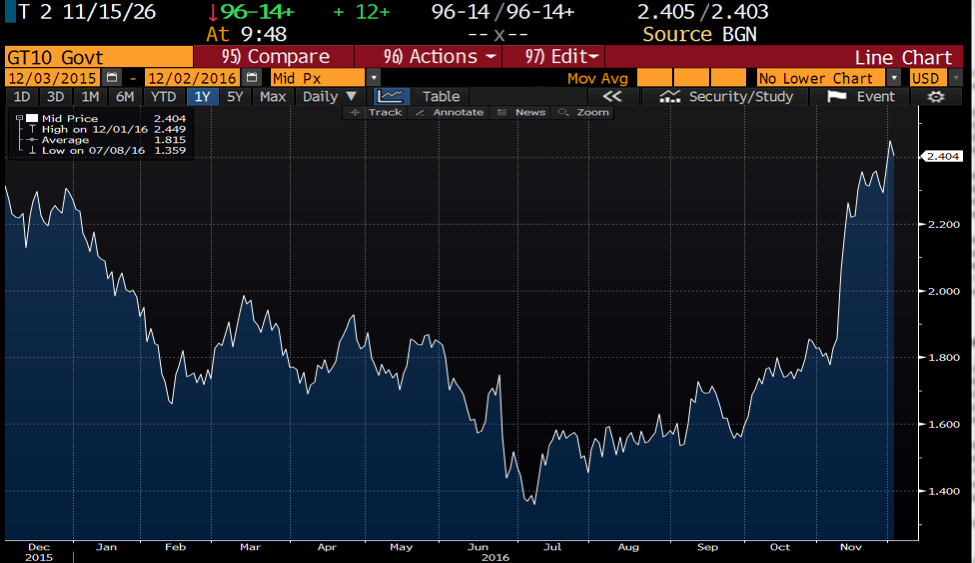Jobs! Oil! Mnuchin! Oh my!
Market Update
Let's all take a deep breath. This week has been heavy on market-moving news.
Today's headline is the November jobs report showing 178,000 jobs were created last month. We're all still dissecting what exactly the Trump Administration has in mind for Fannie and Freddie's future. Plus, we had big oil news early in the week.
What does it all mean? It means rates are moving higher. So let's take these one at a time.
The headline: Unemployment drops again
The U.S. unemployment rate dropped to 4.6 percent in November, the lowest number we've seen since August 2007 and down from 4.9 percent in October. The economy created about 178,000 net new jobs last month, led by employment gains in professional services. Construction — a positive sign for the housing market — also was a bright spot with about 19,000 new jobs created.

Other key indicators in the report showed some concern. Average hourly earnings were up about 2 percent year-over-year but down 0.1 percent compared to October. The labor force participation rate checked in at 62.7 percent, near a four-decade low as people who left the workforce during the recession are still slow to find new employment or have just given up altogether.
A broader measure of unemployment, which includes people working part-time who wish to have a full-time job, is still too high. That rate dropped to 9.3 percent in November, but it's still higher than the 8.3 percent average we saw pre-2008 recession.
The takeaway: The economy is heating up
We're getting close to full employment now in the U.S. Our attention needs to turn to wages. For the year so far, average earnings are up about 2 percent. But we saw a soft spot in November with a 0.1 percent dip in average hourly earnings. Is that just a blip? Or will wages continue to stagnate? It's will be instructive to watch how much wages increase and how many people start to rejoin the labor force. Those readings will be more important than the unemployment rate in the months ahead now that we're consistently below 5 percent unemployment.
Remember, one troublesome factor in this economic recovery has been underemployment. Too many people have left the workforce entirely (gave up on having a job), or they're working part-time when they would prefer a full-time job. With stable job creation, I'm watching to see if wages will grow and if more people get back to working full-time and rejoining the workforce.
These are important trends for mortgages and housing. When people have jobs with growing incomes, they're more likely to buy their first or next home. This is especially important now as home prices are climbing at about a 5 to 6 percent annual clip. Wage growth needs to keep pace for the housing market to keep up with rising prices.
Since Movement focuses on the purchase market, that should give us even more opportunities to serve homebuyers. There have been lots of headlines this week about declining mortgage applications. Just remember that's driven by a slowdown in refinancing, not home purchases. The MBA predicts purchases to increase in 2017.
There will be some impact on interest rates if we keep seeing strong jobs numbers. Weak employment is one reason the Federal Reserve kept benchmark rates near zero for so long. With a healthy employment picture, the Fed will have few reasons to keep rates low. I expect a rate hike at the Fed's Dec. 14 meeting.
Simultaneously, signs of full employment and year over year wage growth underpin the mood on Wall Street that Trumponomics will lead to more growth and inflation. That means investors will continue to move out of bonds and into equities. As a result, bond prices fall and yields rise. Mortgage rates tend to follow the yield on 10-year Treasury bonds, which have risen more than 100 basis points since this summer to nearly 2.40% percent. Check out this chart:

The headline: Fannie and Freddie could be privatized
Steven Mnuchin, Donald Trump's pick to be the next Treasury Secretary, dropped a bomb in an interview with Fox Business' Maria Bartiromo (Casey's pal) this week: He said taking Fannie Mae and Freddie Mac private and out of government conservatorship would be a priority for the Trump administration. After giving few hints at housing policy on the campaign trail, this was a major revelation by the Trump camp.
"We've got to get Fannie and Freddie out of government ownership. It makes no sense that these are owned by the government and have been controlled by the government for as long as they have," Mnuchin said, adding it would be a top 10 priority on the Trump team's economic agenda. "We'll make sure that when they're restructured they're absolutely safe and they don't get taken over again. But we gotta get them out of government control."
Shares in Fannie and Freddie surged more than 40 percent after the interview as investors anticipated the potential ripples.
Taxpayers bailed out the faltering housing giants in the 2008 financial crisis to the tune of $200 billion. In the years following, the mortgage giants have funneled their $235 billion in combined profits back to the U.S. Treasury.
The takeaway: Not so fast, my friend
Fannie Mae and Freddie Mac are critical liquidity providers to the mortgage market. They exist to buy mortgages from originators and provide needed liquidity to the housing sector. So, restructuring their ownership, oversight and capital base will be a serious and contentious issue.
For now, I'm not convinced we need to react too strongly to Mnuchin's statements. His idea makes sense: A healthy Fannie and Freddie, returned to the private sector, would stoke competition and encourage more private investment in the housing market. But it will be a complicated process to create a roadmap for that to happen.
For starters, there's a lack of consensus on this issue in Congress. Many Republicans would prefer to see Fannie and Freddie wind down and replaced rather than returned to private investors. Other lawmakers have advocated for hybrid public-private models. The point is that we should all be in a wait and see mode for now.
Fannie and Freddie are strong, healthy partners to mortgage lenders that provide liquidity and help make homebuying accessible and affordable. Whatever their future, it's something we will watch closely and advocate for a wise and orderly process that doesn't interrupt the flow of credit to homebuyers.
The headline: OPEC cuts production

Oil hit its highest prices of the year Thursday after OPEC struck a deal Wednesday to reduce production by 1.2 million barrels a day. Barrels of brent crude oil, the global benchmark, gained 4.05 percent, to $53.94 a barrel — the highest price since August 2015. The Organization of the Petroleum Exporting Countries' deal to cut output marked the group's first concerted effort to cut back since 2008.
There's some question about how serious OPEC members will be about enforcing this deal. But analysts are cautiously optimistic oil prices will stabilize at these higher prices as supply will move more in line with demand.
Oil producing countries allowed a glut of oil to exist on the market for the past two years as part of an effort to drive oil prices lower and force higher-priced American shale oil producers out of the market. However, slumping demand globally has kept the oversupply around longer than expected, and nations that rely on oil profits are now being forced to take measures that will drive oil prices back up.
The takeaway: Inflation and rising rates is likely
Rising oil prices will mean higher prices at the gas pumps. It could also boost oil production here in the U.S., which would support more economic growth. Combine that with a positive jobs report and expectations President-elect Trump will add more stimulus to the economy with tax cuts and spending, and you get an environment ripe for inflation.
That's not necessarily bad. We've teetered close to deflation in recent years, so some stronger economic growth and inflation isn't all bad if it's controlled and kept in check.
We should all expect interest rates to remain above 4 percent in the year ahead. Investors are shifting to stocks and out of bonds, which is driving rates higher. The Fed is likely to increase benchmark rates this month and in 2017, too.
Historically, this is still a low-rate environment, but we are shifting to a more normal low-rate range instead of these all-time lows we saw earlier this year. Given the uncertainty that still exists as Trump transitions into the White House, I'm expecting plenty more weeks like this one where volatility and quick reactions to economic news keeps us all on our toes.


